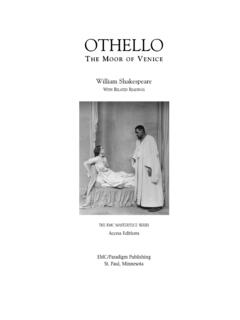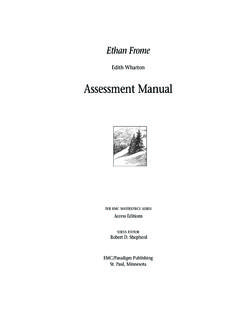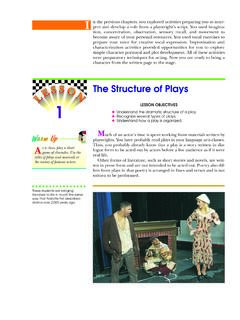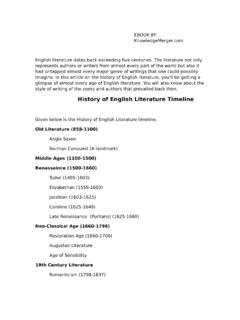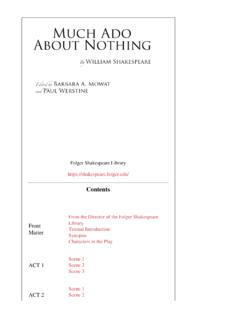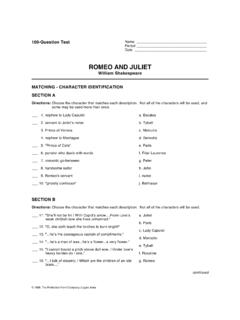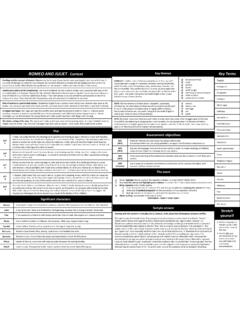Transcription of CALL OF THE WILD CH 7
1 The TempestWilliam ShakespeareTHE EMC MASTERPIECE SERIESA ccess EditionsEMC/Paradigm PublishingSt. Paul, MinnesotaStaff Credits:ForEMC/Paradigm Publishing,St. Paul, MinnesotaForPenobscot School Publishing, Inc.,Danvers, MassachusettsISBN 0-8219-1619-XCopyright 1998 by EMC CorporationAll rights reserved. No part of this publication may be adapted, reproduced,stored in a retrieval system or transmitted in any form or by any means, elec-tronic, mechanical, photocopying, recording, or otherwise without permis-sion from the by EMC/Paradigm Publishing875 Montreal WaySt. Paul, Minnesota 55102 Printed in the United States of 9 8 7 6 5 4 3 xxx 10 09 08 07 Laurie SkibaEditorShannon O Donnell TaylorAssociate EditorEileen SlaterEditorial ConsultantJennifer J. AndersonAssistant EditorEditorialRobert D. ShepherdPresident, Executive EditorChristina E. KolbManaging EditorSara HyryEditorLaurie FariaAssociate EditorSharon SalingerCopyeditorMarilyn Murphy ShepherdEditorial AdvisorDesign and ProductionCharles Q.
2 BentProduction ManagerSara DayArt DirectorDiane CastroCompositorJanet StebbingsCompositorTable of ContentsThe Life and Works of William Shakespeare .. ivTime Line of Shakespeare s Life .. viiiThe Historical Context ofThe Tempest.. xEchoes .. xviiDramatis Personae .. xviiiAct I.. 1 Act II .. 23 Act III .. 43 Act IV .. 59 Act V .. 72 Epilogue .. 83 Plot Analysis ofThe Tempest.. 88 Creative Writing Activities .. 90 Critical Writing Activities .. 92 Projects.. 96 Selections for Additional ReadingfromTrue Repertory of the Wracke (Purchas His Pilgrimes),by William Strachey .. 98from Of Cannibals by Michel de Montaigne .. 110from The Story of Jason and Medea fromMetamorphosesby Ovid (Publius Ovidius Naso).. 116 Glossary .. 117 Handbook of Literary Terms .. 119 TABLE OF CONTENTS iiiivTHE TEMPESTTHE LIFE AND WORKS OFWilliam ShakespeareWilliam Shakespeare (1564 1616).
3 William Shakespearemay well be the greatest dramatist the world has ever mother, Mary Arden Shakespeare, was from a well-to-do,well-connected family. His father, John Shakespeare, was aprosperous glove maker and local politician. William s exactbirthdate is unknown, but he was baptized in his hometownof Stratford-upon-Avon on April 26, 1564, and tradition hasassigned him a birthdate of April 23, which was also the dayof his death and the feast day of Saint George, England spatron attended the Stratford grammar school, wherehe studied Latin and perhaps some Greek. At the age of eigh-teen, Shakespeare married an older woman, Anne Hathaway,who was with child. Altogether, William and Anne had threechildren, Susanna and the twins Hamnet and Judith. He mayhave worked for a while as a schoolteacher, for there aremany references to teaching in his plays. By 1592, however,he was living in London and pursuing a life in the continued to provide for his family and toexpand his holdings in Stratford while living in London.
4 Heretired to Stratford-upon-Avon at the end of his s Professional CareerBy 1593, Shakespeare was a successful actor and history playsHenry the Sixth,Parts 1, 2, and 3, andTheTragedy of Richard the Thirdhad established him as a significantforce in London theater. In 1593, when an outbreak of theplague forced the closing of the theaters, Shakespeare turnedto narrative poetry, producingVenus and Adonisfollowed byThe Rape of Lucrece,both dedicated to a patron, the Earl ofSouthampton. When the theaters reopened, Shakespeareplunged back into his primary vocation, and wrote thirty-seven plays in less than twenty years, includingThe Taming ofthe Shrew; A Midsummer Night s Dream; The Merchant of Venice;Twelfth Night, or What You Will; All s Well That Ends Well; TheTragedy of King Richard the Second; The tragedy of romeo andJuliet; The tragedy of Julius C sar; The tragedy of Hamlet, PrinceWilliam ShakespeareTHE LIFE AND WORKS OF WILLIAM SHAKESPEAREvof Denmark; The tragedy of Othello, the Moor of Venice; TheTragedy of King Lear; The tragedy of Macbeth; The Winter s Tale;andThe 1594, Shakespeare became a shareholder in a the-ater company known as The Lord Chamberlain s Men.
5 Thetroupe quickly became the most popular in London. By 1599,they were weatlthy enough to build their own theater, a largeopen-air playhouse they called the Globe, and in 1603 theybought the Blackfriars, a small, artificially lighted indoor the-ater for winter performances. Their company began perform-ing regularly at the court of Queen Elizabeth I. After the deathof Elizabeth in 1603, Shakespeare s company became, official-ly, servants of King James I, and their name was changed toThe King s Men. Shakespeare s final noncollaborative play,TheFamous History of the Life of Henry the Eighth,was performed inLondon in 1613. Later that same year, he collaborated withJohn Fletcher to write a play calledThe Two Noble time he was probably living again in Stratford, in a largehouse called New Place that he had bought in 1597. When hedied in 1616, survived by his wife and his two daughters,Shakespeare was a wealthy man.
6 He was buried in the HolyTrinity Church in Stratford-upon-Avon, where his bones restto this day. The stone over his grave reads,Good frend for Jesus sake forbeare,To digg the dust encloased heare:Blest be the man that spares thes stones,And curst be he that moves my Publication of Shakespeare s PlaysShakespeare did not personally prepare his plays for publi-cation, and no official collection of them appeared until afterhis death. A collection of his sonnets, considered by critics tobe among the best ever written in English, appeared in individual plays were published during his lifetime inunauthorized editions known as quartos. Many of these quar-tos are quite unreliable. Some were probably based on actors memories of the plays. Some were reprintings of so-calledprompter s copies used in production of the plays. Some mayhave been based on final manuscript versions produced bythe author.
7 In 1623, seven years after Shakespeare s death, hisfriends and fellow actors John Heminge and Henry Condellpublished a collected edition of thirty-five of Shakespeare splays. This collection is known to literary historians as theFirst Folio. In the centuries since 1623, and especially duringthe last century and a half, editors have worked diligently tocompare the various early printed versions of Shakespeare sworks to determine which version or versions of each playbest represent Shakespeare s s Finest AchievementFragments can be tantalizing. They tempt people, awak-ening a desire to reconstruct the missing pieces. Since verylittle is known of Shakespeare s life beyond a few officialrecords and comments in diaries or letters by others, manypeople have been driven to speculate about the private life ofEngland s greatest author. Such speculation is made all themore difficult by the fact that Shakespeare did not write in apersonal vein, about himself, but rather concentrated hisvision on the lives of others.
8 Reading his plays, or seeingthem performed, we come to know many of his charactersbetter than we know most people in our lives. A character-istic of Shakespeare s greatness is that his work takes us onjourneys into parallel universes, into other minds, so that hischaracters innermost feelings, dreams, wishes, values, moti-vations, and even contradictions become accessible. This is,perhaps, Shakespeare s finest Authorship of Shakespeare s PlaysThe fact that Shakespeare was a commoner and led,according to the few facts we have, a rather ordinary life, hasled many people to speculate that his plays were written bysomeone else by the Earl of Oxford, perhaps, or by BenJonson, but there are good reasons to believe that Shakespearewas, indeed, the author of the plays attributed to him. Onereason to accept the traditional attribution is that the playsshow an understanding of the lives of people in all stationsof life, from the lowliest peasants to men and women of thecourt.
9 We know that Shakespeare came from a commonbackground and later moved in court circles, and this fact isconsistent with his understanding of people from all walks oflife. At the very least, a careful reader must conclude that theplays attributed to Shakespeare are the work of a singleauthor, for they have a distinct voice not to be found in thework of any other dramatist of his day a voice that hasenriched our language as none other has ever Uniqueness of Shakespeare s WorkNo brief summary can begin to catalog the many virtuesof Shakespeare s work. He was a gifted observer of people,capable of creating unforgettable characters from all stationsand walks of life. He used one of the largest vocabularies everemployed by an author, filling his plays with concrete detailsviTHE TEMPESTand with speech that, while not always realistic, is alwaysengaging and believable.
10 His plays probe the range of humanexperience. They are romantic in the sense that they arefilled with passions conveyed intensely. However, the playsrarely strain credibility or sink into sensationalism or senti-mentality. Shakespeare s language tends to be dense,metaphorical, full of puns and word play, and yet natural, sothat it comes trippingly off the tongue of an actor. A scenefrom Shakespeare tears across the stage, riveting and dramatic,and yet it bears close rereading, revealing in that rereadingastonishing depth and complexity. Shakespeare used in hisplays a combination of prose, rhymed poetry, and blankverse always appropriate to the character or scene at plays have given many, many phrases to the English lan-guage. They have filled audiences with laughter, joy, pity,fear, sadness, despair, and suspense for over four hundredyears. In fact, his works have been performed more often andin more countries around the world than those of any otherdramatist.




